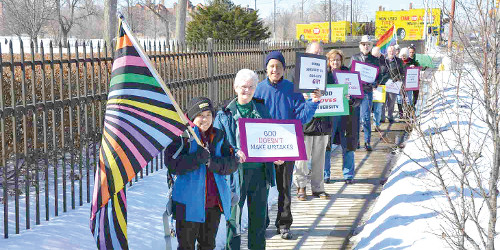Background
Mainstream religious denominations support LGBT equality. For decades, the Unitarian Universalist Association, the United Church of Christ, and the Metropolitan Community Church have had policies of LGBT inclusion, including ordaining LGBT people, performing weddings for same-sex couples, and advocating for LGBT equality in society. More recently, The Episcopal Church, Conservative Judaism, the Evangelical Lutheran Church in America, and the Presbyterian Church (USA) have all adopted policies of LGBT inclusion. Their leaders are often vocal supporters of marriage equality, employment non-discrimination, transgender inclusion, and other LGBT issues.
Other denominations are home to robust debate about LGBT issues and equality. Others denominations continue to openly debate issues of LGBT inclusion, the blessing of same-sex couples' unions, and the ordination of LGBT clergy, with growing support for full inclusion. For example, the United Methodist Church has not changed its policies to be more LGBT inclusive, but several United Methodist leaders have challenged those policies, as well as advocated publically for LGBT equality. Even the Mormon Church has softened its tone toward LGBT people, no longer advocating for family alienation and so-called "ex-gay" programs.
LGBT people of faith are rarely represented in mainstream media. Groups like Dignity/USA (LGBT Catholics), Integrity (LGBT Episcopalians), Reconciling Ministries Network (LGBT Methodists) and More Light Presbyterians represent affinity groups within some of the nation's largest Christian denominations.
Best practices for reporters
Pull apart the assumptions about values, religiosity, sexuality, and the intersection of church and state underlying anti-LGBT religious voices and their influential presence in the news. Despite their under representation, there are LGBT-affirming religious voices cited in the mainstream media, some of whom even identify as LGBT themselves. Many of these voices come from affirming religious groups with a significant presence in the United States.
Consider whether anti-gay activists' attacks on the dignity and equality of LGBT people warrant a media spotlight. When such prejudice is newsworthy or must be quoted, please seek out religious voices who support LGBT equality and can effectively address those attacks in the language of inclusive faith.
Pitfalls to avoid
Do not repeat the myth that LGBT equality is universally opposed by people of faith. This myth, combined with vitriolic opposition to LGBT people and families by anti-LGBT activists who claim the mantle of Christianity, frequently leads to media coverage that falsely positions LGBT equality as a matter of "gays vs. religion."
Do not identify anti-LGBT activists as representing the "religious" or "Christian" view, while excluding religious voices that are in favor of LGBT inclusion. Anti-LGBT activists — including groups such as Focus on the Family, Family Research Council, Traditional Values Coalition, and the Institute on Religion & Democracy — often claim to represent the views of religious Americans. Yet these groups' policy views are not shared by the majority of those they claim to represent. This is especially true for Roman Catholics, nearly three-quarters of whom support LGBT equality, despite anti-LGBT language and actions from many in the Roman Catholic hierarchy. Large majorities of all Americans, including people of faith, favor inclusive non-discrimination laws, military service, inclusive hate crimes laws, and family recognition (whether by marriage or civil unions) for LGBT people.
Focusing on Faith in Reporting
In 2014, GLAAD and the Human Rights Campaign Foundation released "In Focus: Faith, LGBT People, & the Midterm Elections,” a groundbreaking resource guide that empowers journalists to challenge anti-LGBT talking heads who mask bias as a ‘tenet of faith.’ The guide is designed to help the media provide accurate information about LGBT people and faith in the lead up to the 2014 midterm elections. Mainstream media outlets use far fewer religious sources from Mainline Protestant, Jewish, or other denominations whose messages were predominantly positive and accepting of LGBT people. Far too often, outlets frame stories as "God vs. Gay," inaccurately representing the current climate of acceptance across faith communities today. The guide seeks to correct these disparities in reporting.
Resources for journalists
- Missing Voices
- Institute for Welcoming Resources
- National Black Justice Coalition
- World Congress of GLBT Jews
- Religious Institute













